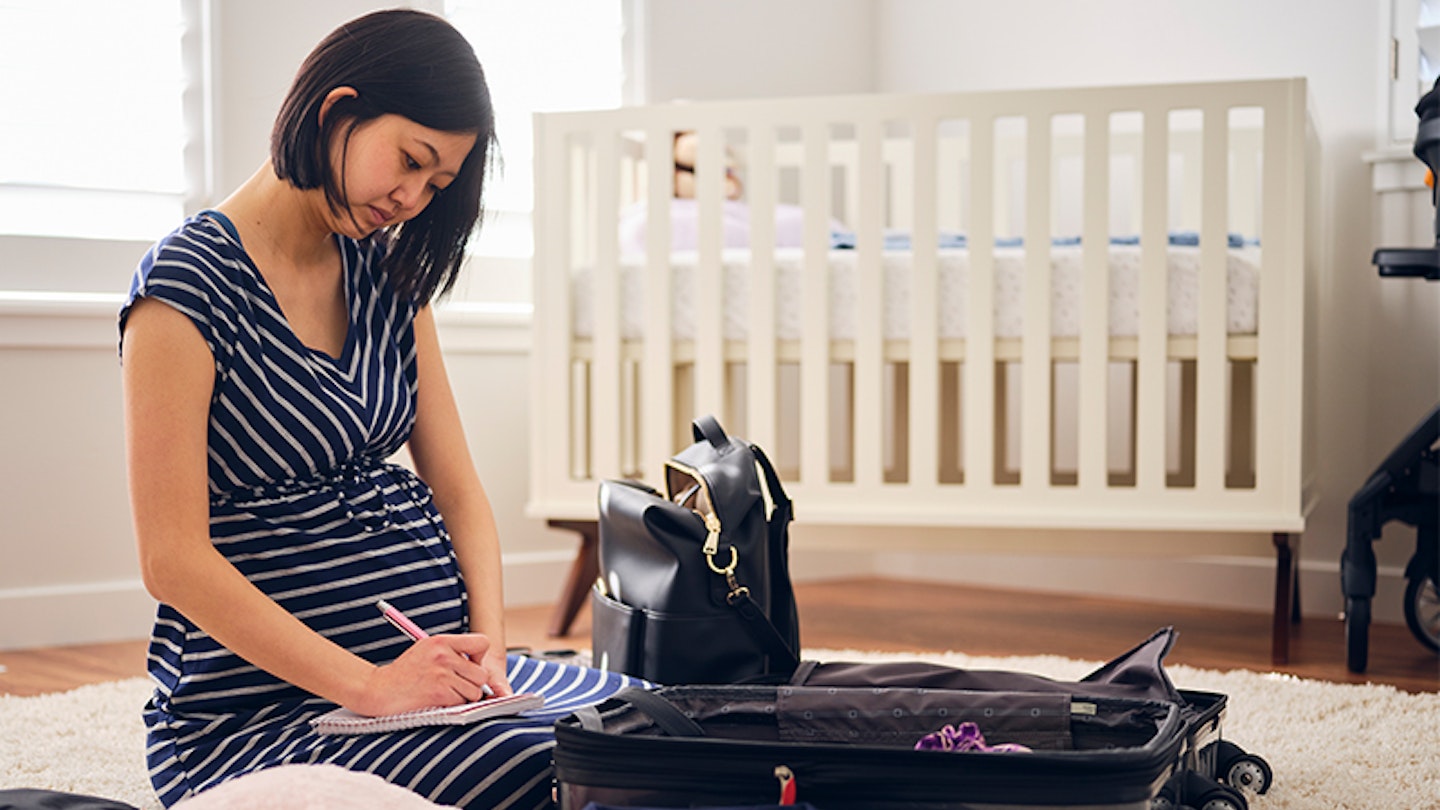Pillows, pants, newborn nappies – and, of course, your favourite snacks are essentials for your hospital bag checklist. You’ll want to have these to hand as labour nears, and you prepare for that exciting moment when you welcome your new baby into the world.
We think packing your hospital bag should be an easy and fun experience, that’s why we’ve spoken to a huge range of experts and mums to make sure you’ve got a comprehensive list of all the must-haves… and a few little extras, if you fancy them.
Try to start packing early so that you can enjoy the build-up – it’s never too early to start! Whenever you get the urge to nest in pregnancy is a great time to start packing your bag. We recommend printing off our checklist or saving it on your phone so you can take it with you and pick up what you can on the go, which makes life that bit easier. Of course, if you get the snacks too early, they might all be gone by the time labour comes around!
One thing to note is that your hospital might have some items already available, such as a birthing ball, so if you have the time, it might be a good idea to contact the hospital directly, or your midwife, to find out what they have. Don't worry too much about this though - if you're short on time, just pack extra and then you're all prepared either way.
Your hospital bag checklist: labour and delivery
We consulted Lesley Gilchrist, midwife for 20 years and founder of My Expert Midwife, and our online community of #mumtribe mums who have recommended their top hospital bag must-haves. Here's what you need.
Labour essentials
• Your birth plan and hospital notes - Having these packed away in your hospital bag means you won't forget them if you suddenly go into labour. Lesley says, "Having your notes handy will mean your doctors and wider medical team will know your history easily, whilst your birth plan gives a clear idea of what’s important to you and how you’d ideally like the birth to be."
• Key contact numbers and information - Write them down as well as having them on multiple devices, in case the battery dies. You need:
1 - Your doula's phone number
2 - Contact details for your hospital, or the doctor, nurse or midwife you have been in contact with
3 - Your partner (or birth partner's) phone number
4 - Your NHS reference number
5 - Phone numbers for support, such as the NCT parent support helpline: 0300 330 0700
• Comfy clothes – When thinking about what to wear in labour, comfortable clothes are a must for your hospital bag! Whether it's a vest top, slouchy T-shirt or comfy robe to wear in labour or after. You might prefer to go primal and take it all off or you may want a bikini top if you’re in the pool, but chances are you won’t really care.
• Hairbands or a headband - Or a headscarf/wide headband to keep your hair out of your face. #Mumtribe mum, Aimee Taylor, says to bring plenty of hair bands! 'I only had one and it took my OH ages to find it for me (very annoying when mid-contraction 🙈).'
• Plenty of snacks – Some kind of survival snack pack for the postnatal ward is essential if you need fuel in the middle of the night. Aim for healthy snacks but also have a good mix of things you enjoy. Dark chocolate is the healthier option of the cocoa world, but this isn’t the time to berate yourself if all you fancy is a Mars bar. You might also want to pack a takeaway menu (thanks to mum Celia Stanworth for the suggestion) and mum, Gemma Bailey, recommends remembering to bring some change for the vending machine – a backup plan is always useful!
• Portable charger – It's not always easy to find a plug for your phone in a hospital, so make sure you pack a fully charged portable charger. You’ll be so busy taking photos of your new arrival and answering congratulation texts, you might not realise your phone is running low on charge. That said, a few of you recommended taking a camera as well, just in case the inevitable does happen!
• Lightweight dressing gown – Or some kind of robe you can throw on if you’re birthing in a pool, or if you have a few days’ stay at hospital and you’re going to the loo and back a lot. Midwife expert Lesley recommends taking your dressing gown as it "introduces your baby to comforting smells and friendly bacteria."
• Baby wipes – While you might have already packed some in your baby bag, making sure you have an extra pack of baby wipes is a good idea! They're great for you to use if you need them, but if you run out you don't have to worry about popping to the shops!
• Washbag – Toothpaste and toothbrush, hairbrush, cleansers and soaps, moisturiser and any other toiletries you'd pack for an overnight stay.
• Dark towels - We'll just leave this one at that.
• Big pants – Always think big with the knickers. You’ll need to wear maternity pads for a while after your baby is born, and if you’ve had a C-section you really don’t want anything touching the scar area. Granny and maternity pants a-go-go! Our #Mumtribe mums agreed:
Erin Kyle - 'Maternity C section pants were a must. I was advised just to buy cheap bigger sized pants from ASDA & they were so uncomfortable.'
Catherine Dobson Hasnain - ‘M&S maxi pants were the bomb for the post c section. But black knicks in case of leaks....’
Sophie Knight - ‘If you have a c-section you need the biggest ones M&S sells.
• TENs machine – Plus batteries. The hospital might have one of these, so you can check if you don't want to invest in one. If you do buy a TENs machine, practise how to put it on first, as you don’t want any fiddling around with the pads while you actually could do with reaping the benefits.
• Handheld fan – Multiple mums recommended bringing a handheld fan, especially if you are giving birth in the summer, as wards can get incredibly hot. Try and get a quiet one too, in case you need to use it in the night. We recommend this portable fan from Amazon. New mum Emma Dart says a handheld fan helped keep her cool during labour.
• Slippers or flip-flops – Whichever you prefer, the floors might be chilly as you’re pottering around the postnatal ward. New mum Sarah Elizabeth says: "I don't normally wear slippers but they were great for the hospital floor."
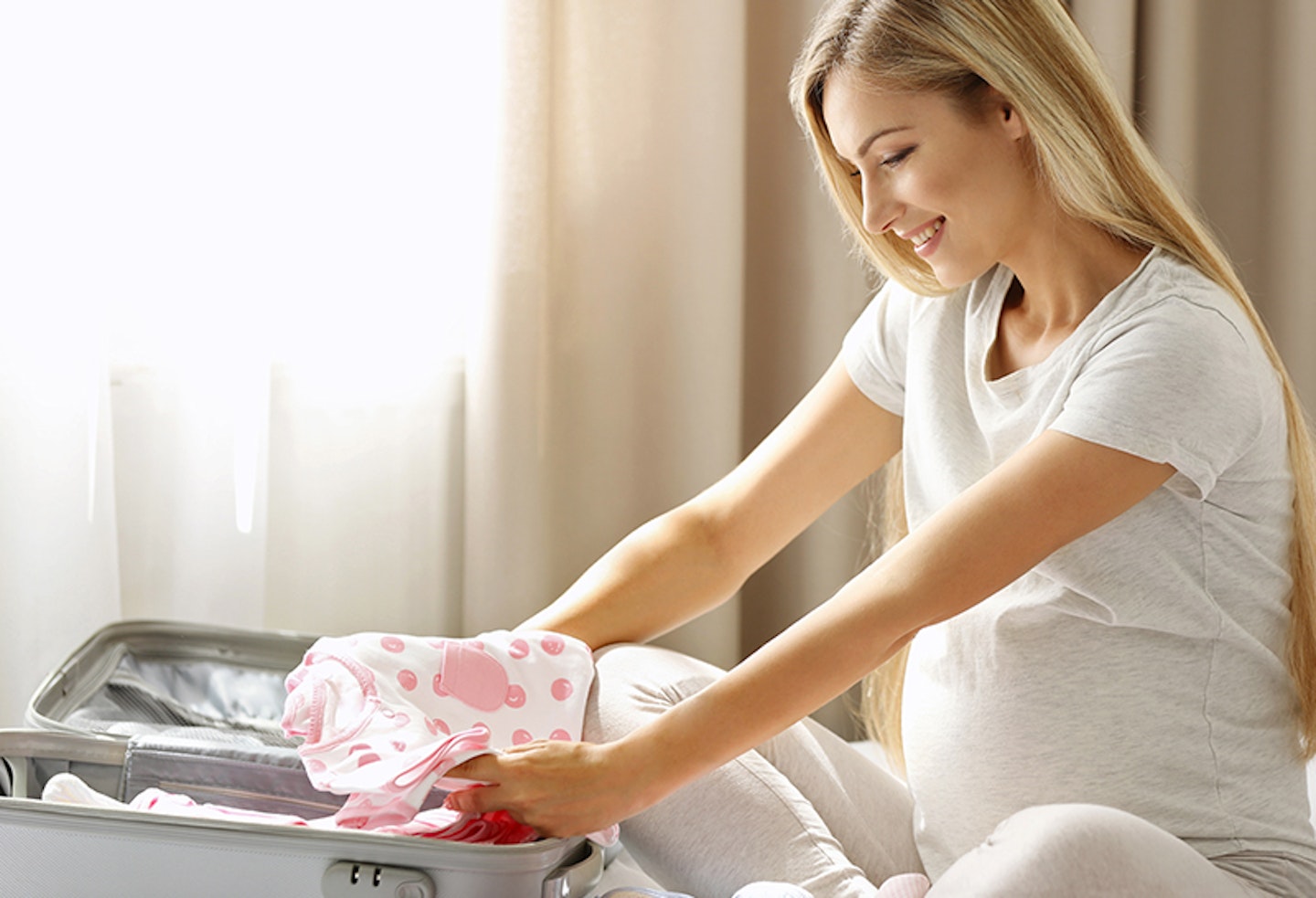
• Earplugs – Postnatal wards aren’t generally that peaceful, and don’t worry about not hearing your baby cry. We have a sixth sense for these things. Earplugs for sleep might just allow you a bit of valuable rest. Mum Laura Bratherton says earplugs were essential to get some sleep, as "the wards were so noisy."
• Lip balm – There's a lot of heavy breathing involved in labour, so this one is a must. Mum, Aimee Taylor, recommends having a lip balm handy for after birth too, 'as the gas and air really dries them out'.
• Entertainment – You never know how long your labour will last or how long you'll be in the hospital for, so download some music playlists and podcasts for some enjoyable distractions - or create your own bespoke birthing playlist with your partner. Guided meditation or hypnobirthing relaxation downloaded onto your phone will keep you chilled out, games that don't take too much effort are good, and mobile internet + tablet + Youtube = unlimited comedy shows! Perfect to keep you laughing and those happy endorphins flowing. You might want to use some entertainment to give you a boost of oxytocin too. A book or magazines can also be handy to pass the time.
• Maternity pads – A common one mums mentioned, although most of you will already have these on your list, you might be surprised by how many you go through during labour itself, so pack some extra ones to get you home! Mums recommended opting for Tenna pads over maternity pads, as many found them less likely to leak (and much cheaper) than the pregnancy targeted pads. Mum Emma Dart says: 'Bring plenty of maternity pads, you'll need more than you think!'
• Straws and/or frozen drinks – Straws are a must, according to most mums. One mum highly recommends chucking loads of cartons of Ribena in the freezer in the days before you go to the hospital, then when the moment comes to go to hospital, throw them in the bag. They’ll be cold and refreshing throughout your labour, and it’s useful to have drinks with a straw so that if needs be, your partner can help you to drink and you can be hands-free. If there are any leftover once the baby is born, it’s great for making sure you keep hydrated and keeping your blood sugar levels up. Alternatively just a straw on its own means you can drink more easily from any receptacle, in any position.
• Cash – Handy for the parking machine, snacks if you run out, or whatever else may come up. It's a small effort for a big relief if you need it.
When breastfeeding consider:
For breastfeeding, you may want to use these items...
• Nipple creams - You may not feel sore with the initial stages of breastfeeding in hospital if your baby takes to it like a pro, but you’ll need lots of nipple cream during your breastfeeding journey anyway, so it’s best to have it to hand. Mums Iwona Bijak and Helen Cordell also recommend two of the creams and balms that feature in our shortlist of the best nipple creams. Iwona loved 'Multi-Mam Sore Nipples Compresses and Multi-Mam Nipple Balm' as 'both do not need to be washed prior to feeding.' Helen noted, 'definitely Lanisnoh lanolin nipple cream'.
• Pillows - Small touches such as a pillow can be a great way to remind yourself of home comforts. #Mumtribe mum, Laura Bratherton, noted this as one of the key things she took in her hospital bag, as it allowed her to soften into labour and feel more relaxed in a totally unfamiliar environment. Laura also highlighted the need for different types of pillows: 'I also didn’t take my feeding pillow the first time around, which would’ve been a huge help. I did get a spare one in the hospital but would’ve preferred my own.' Bringing your pregnancy pillow can also provide extra comfort when you need it. .
• Nursing pads - To keep you dry and comfortable after a feed.
• Nursing bra - You might not need this if you plan on going bra-less, but you might want to bring one in case you want the support.
• Open front pyjamas - Anything you feel really comfy and cosy in, with a high, loose waistband and easy access for breastfeeding. You need to feel comfortable. Dark colours are best - it’s maybe not the time for your Cath Kidston flowery white stuff, as you never know what kind of bodily fluids from you and your baby are going to be spilling all over it. You might fluctuate between being boiling and being a bit chilly, so have something that’s easy to take on and off, or maybe bring yourself a scarf you can throw over your shoulders for those chilly moments. Lucy Coe, #mumtribe mum, said 'some nice new PJs' were essential for her hospital bag.
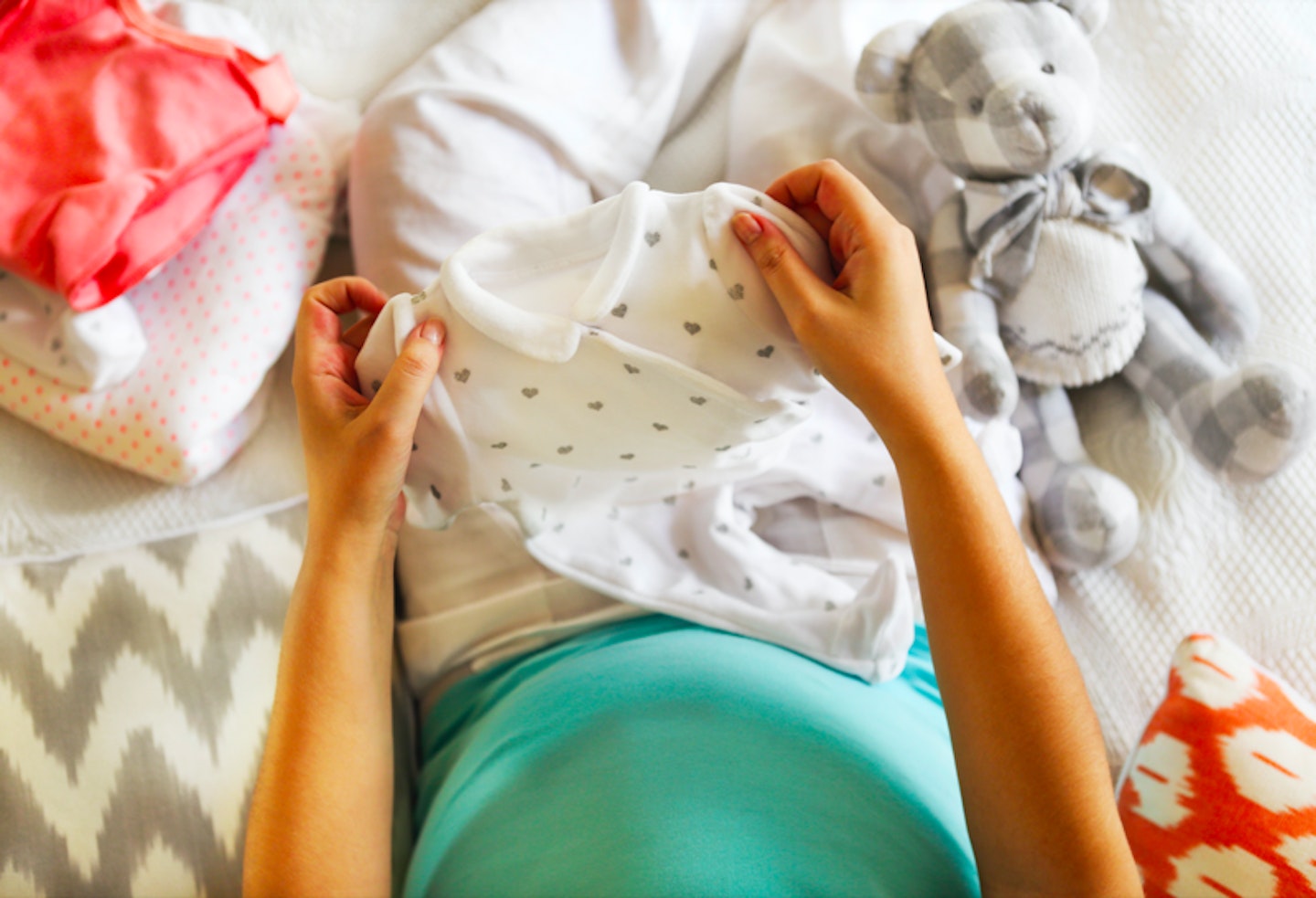
The extras that might make the difference:
• Facial spray - Facial spray, be it a water spray or rose facial spritz. It doesn’t have to be anything expensive - a plain spritzing bottle with water will do - but it’s great for refreshing and cooling you down during labour. It's also great for the postnatal ward if you feel you need a pick-me-up. We are huge fans of this hydrating spray by Mario Badescu which is jam-packed with Aloe Herbs And Rosewater.
• Wheat bag - They are amazing for relieving tension, and can be placed over your eyes, face or lower back. A hot water bottle can perform the same function for the lower back, easing pain and tension. They’re great postnatally too if you’re on the ward, as a lavender wheat bag over the eyes will help to send you to a zen place.
• Lavender - Lavender oil has multiple uses. It can be used for your partner to massage your lower back or neck, and it has a comforting and uplifting scent that can have amazing powerful effects for relaxing and calming you down during labour. A few drops on a flannel draped across your forehead can also help to shut out the world around you if needs be, and help you to get into the zone with deep breathing. It’s also an antiseptic, so a few drops on your maternity pad post-birth can help to soothe your perineum. It’s a proven antidepressant as well, and aids relaxation and sleep: so postnatally a few drops on your pillow or dabbed behind your ears can be magic for the soul.
• Mints - Many mums told us the gas and air left a horrible taste in their mouths, so a pack of polos could be a good addition to your hospital bag. Giovanna Fletcher also packed mint essential oil for her third birthing experience, simply applying to a tissue and keeping it nearby, to give a refreshing lift when needed.
• Birthing ball - If you are planning on using a birthing ball, you may wish to bring your own, even if the hospital has some available - that way you can be as comfortable as possible. You can always check with your midwife though as if you don't mind either way, it's one less thing to pack.
Hospital bag checklist for your birth partner
Whoever will be with you on the day, be it your other half, relative, friend or other, they may wish to prepare a few things to bring as well. These include:
• Music - Give your birth partner the responsibility of DJ, or get them to prepare a birthing music playlist. Most delivery rooms will allow you to play your own music which can really make all the difference. Get them playing anything that soothes your soul, that makes you happy or that you associate with good memories and times where you felt supported, loved and safe.
• Entertainment - They may want their own tablet if you are using yours - loaded with films and box sets. The same goes for games, books and newspapers for any times where there might be a lull in the action.
• Snacks and drinks - It can be tricky for a birth partner because they might feel they don’t “deserve” any time off to go out and refuel if you’ve been in hospital for a while. Have a stash of nibbles.
• Toiletries - Toothbrush and toothpaste, their own soap if they want some, and anything else to help them feel fresh if you’re in the hospital for a while. We tend to forget about birth partners but they’re less likely to be allowed to have a shower and so on, so even packing some deodorant – that you can both use – will mean that you’re slightly more prepared for an extended stay.
• A change of clothes - Your birth partner may well need a fresh pair of pants and a change of T-shirt if your home isn’t on an easy trip from the hospital.
• Another phone charger - Or another charging pack. You'll both see a lot of activity on your phones, with texts and calls from excited and anxious family and friends waiting for the big news. You'll want to make sure the battery has plenty of juice for the huge announcement!
• Camera - We've mentioned this in passing, but if you have a high-quality camera or polaroid - definitely bring it. We rely so much on our phones for cameras these days but don’t take any chances and pack a camera to record your baby’s precious first moments in the world.
Hospital bag checklist for mum after delivery
• Toiletries and make-up - This might seem silly, but after your baby is born you might have visitors and people taking photos with you and your baby, so you may want to have a few bits to help you feel your best.
• A fresh outfit - You'll need something comfy to leave the hospital in, like leggings or a loose maternity dress.
• Peri bottle - A peri bottle is a squirty dispenser that allows you to gently clean your private parts in those first few days after giving birth. Even if your labour was very straightforward and you didn’t need any stitches, your skin will still need time to recover.
Hospital bag checklist for baby
Parenting expert Anya Hayes knows exactly what to bring for your baby, for after the birth. These include:
• Car seat - You can't go home without this!
• Babygros/bodysuits x3 - Check out some examples of what clothes to buy for your newborn.
• Bottles and formula - For if you're not breastfeeding.
• Baby wipes
• Sleepsuit x1
• Going home outfit
• Scratch mittens
• Booties or socks
• Newborn nappies x25
• Muslin squares x5
• Hat
• Blanket
• Baby snowsuit - If it's really cold
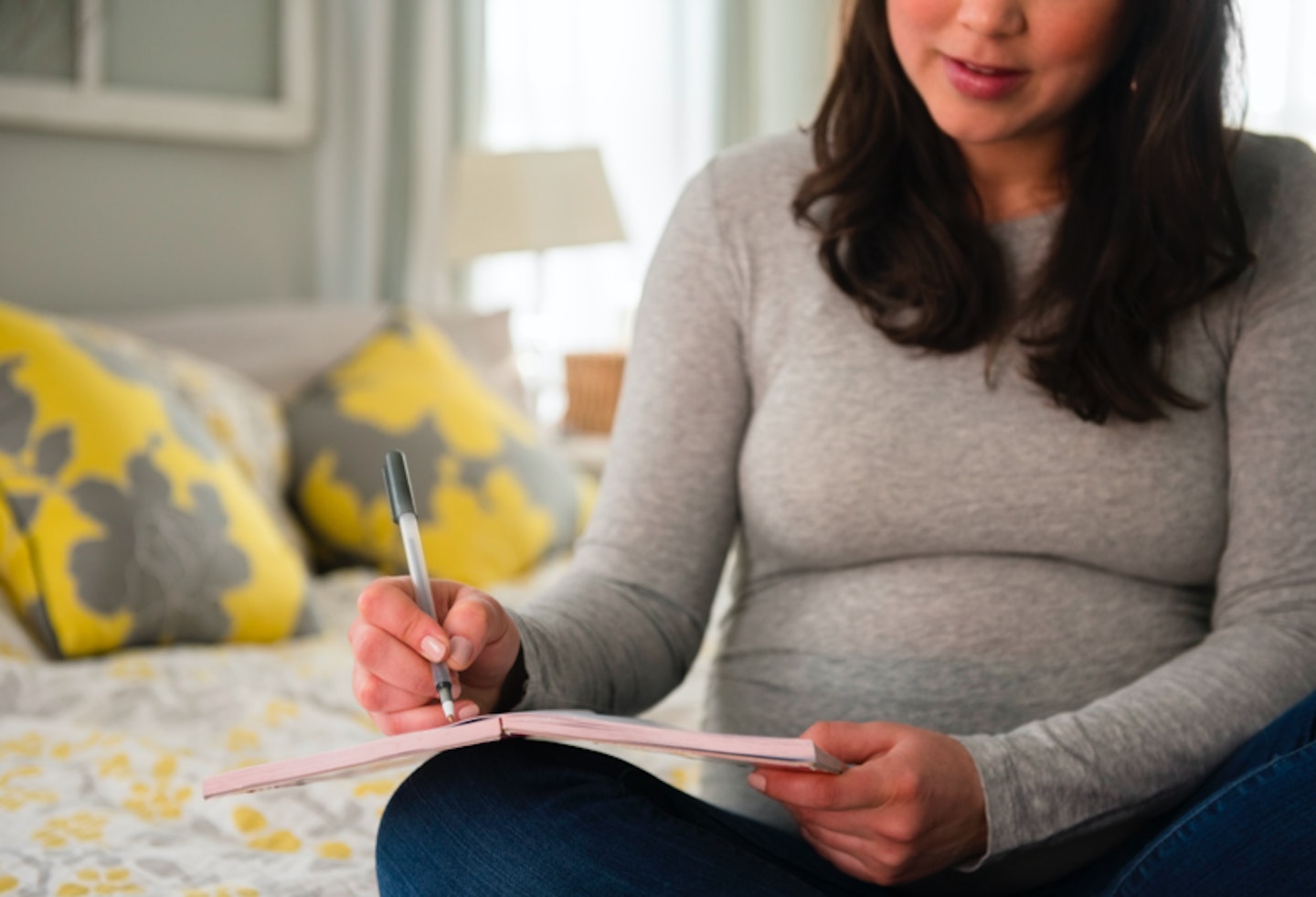
When should I start packing my hospital bag?
You can start packing as early as you'd like! There is no set time for this, so you can start in your third trimester but we'd recommend you're packed and ready for roughly 36 weeks pregnant. Since you can go into labour as early as 38 weeks, it's good to have your hospital bag prepared at least 2 weeks before then so that you have time to add any last-minute things you might have forgotten and to ensure you are prepared in case you go into labour early.
Your due date is always only a rough estimate and all bodies are different, so it helps to get your bag packed and be prepared with time to spare!
Even if you're not planning to give birth at the hospital, or at a birthing centre, you may want to have the below items ready to go so you're prepared for any unexpected hospital trips. They are also all things you'll need for during and after a home birth too, so it makes sense to get prepped and have your essentials on hand whatever the case. Once packed, keep your small suitcase or bag by the door ready to go.
What should I use as a maternity hospital bag?
The size of your maternity bag completely depends on you. Some mums-to-be decide to take three separate ones for mum, birth partner and baby to help them locate things quickly and easily, but others choose to just pack one bag which is roughly the size of a gym bag.
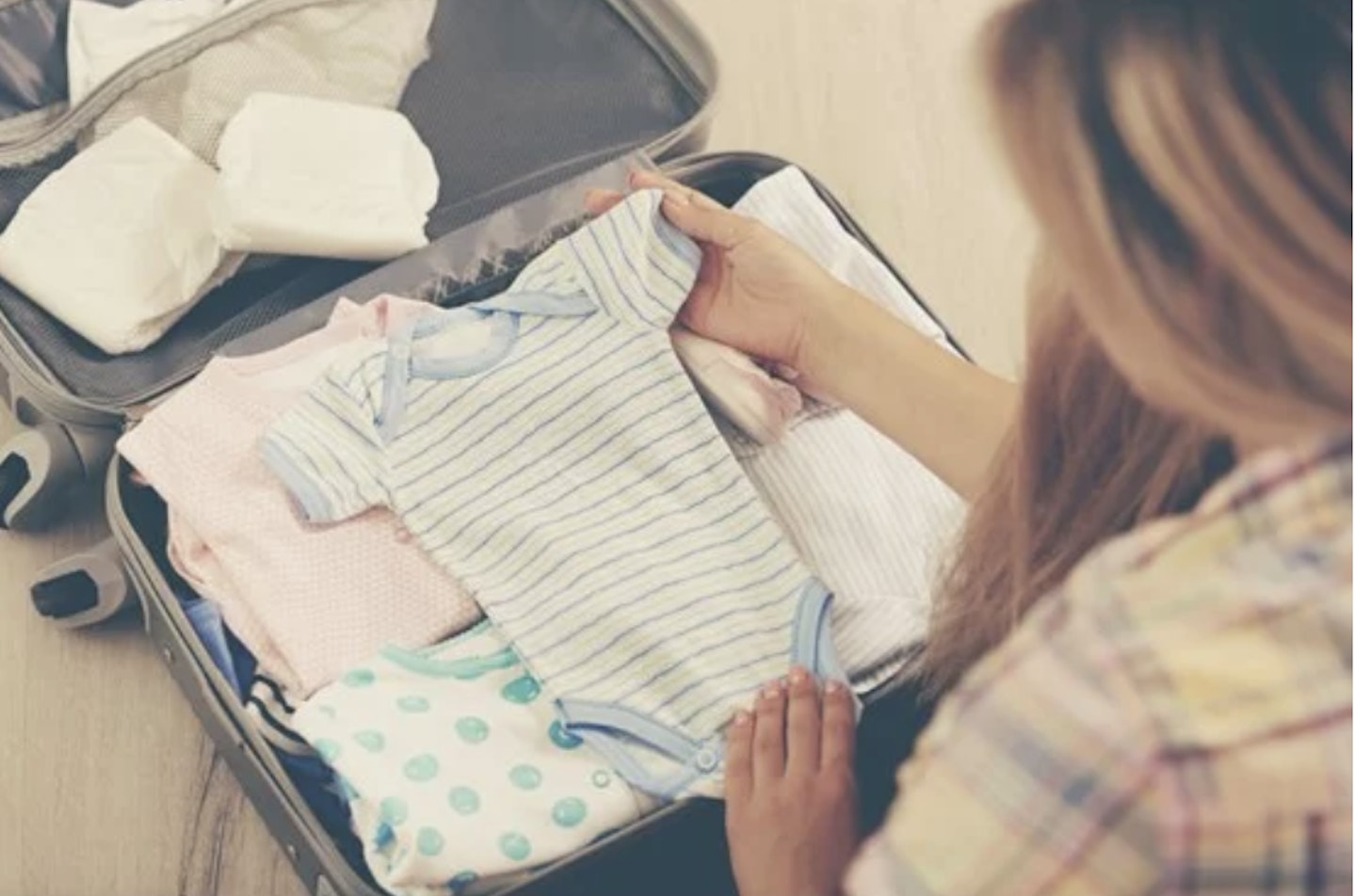
Tips for packing your hospital bag
Birth expert Hayes gives her top tips about enjoying putting together your hospital bag, for the best birth ever.
Use it as part of your ‘nesting process’
“Packing your hospital bag – or ‘birthing bag’ if you’re planning on a home birth, it’s still good to have all your gear ready and available somewhere – can be a wonderful part of the nesting process, allowing you to positively visualise what is shortly going to be happening,” says Hayes. “It’s a ritual to get you into the mindset for your impending motherhood. It’s a great way of channelling your organising instincts, and allowing any jitters a space to calm.”
Get your birthing partner to pack the bag
Hayes recommends first gathering together and laying out all of the things in your hospital bag list that you want to pack. “You can pack the bag yourself if it helps you in terms of nesting and ritual,” she says. “But then, unpack and get your birth partner to pack the bag. They are the ones who will be unpacking it to find things while you’re otherwise engaged during your labour, or lying in bed with your newborn. It’s useful and less stressful for everyone if they have an awareness of what and where on earth it all is.”
Get organised!
She also recommends having one maternity hospital bag for your own birthing and postnatal things, and another just for the baby, to make it easier for rummaging purposes. But if you don't manage to get all these items, don't worry.
“Don’t fret too much about the hospital bag,” Hayes adds. “We live in the modern world, so you can always get someone to nip out and buy things you’ve forgotten if you need them.
“It’s more a good nesting ritual to help you to visualise bringing your newborn into the world. Always try to get into a calm mindset when you think about packing it, and never worry about not having something that you hear is ‘essential’.”
Here's our handy hospital bag checklist
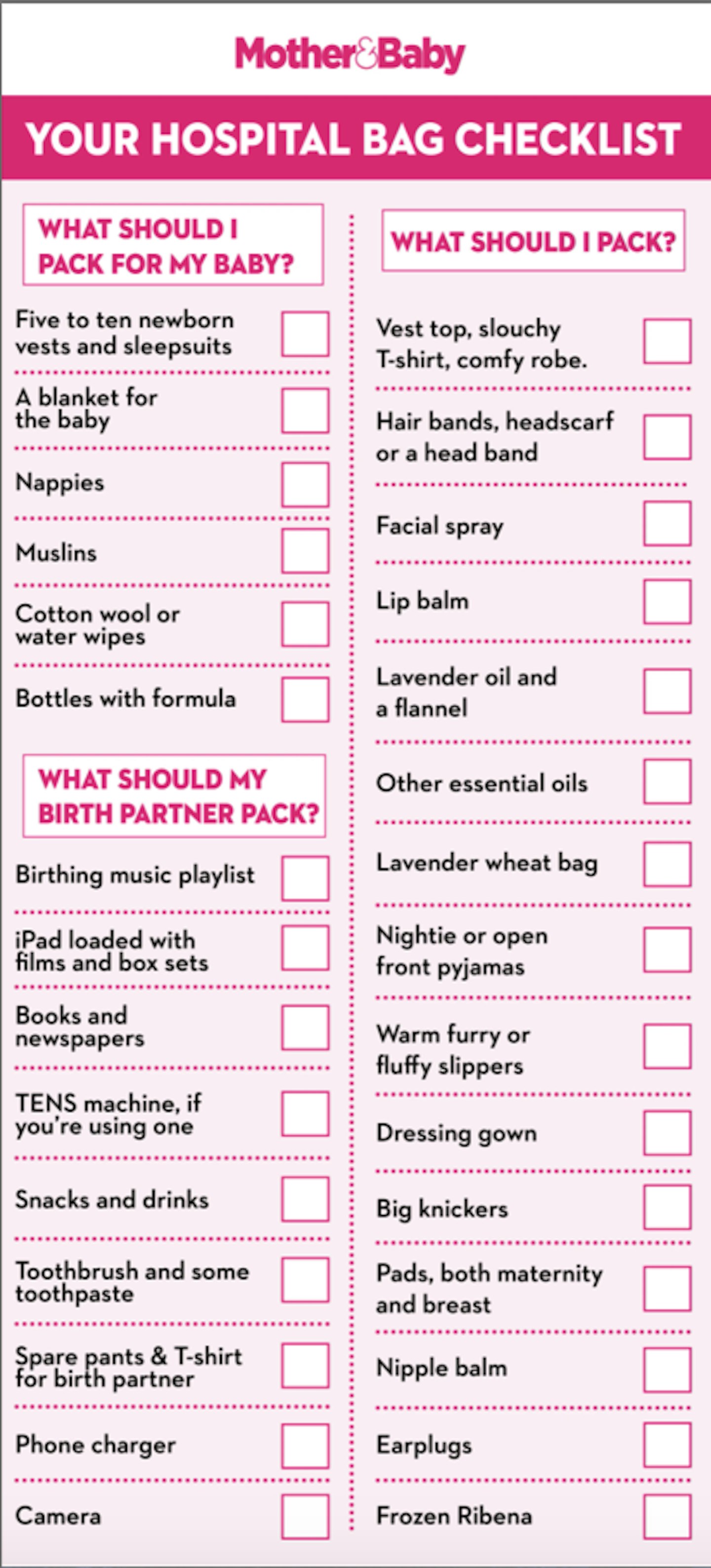
Stephanie Anthony is the Deputy Digital Editor at Mother&Baby and auntie to four aged 7 to 2 months old. With a particular interest in health, she loves discovering products that make parent’s lives easier.
